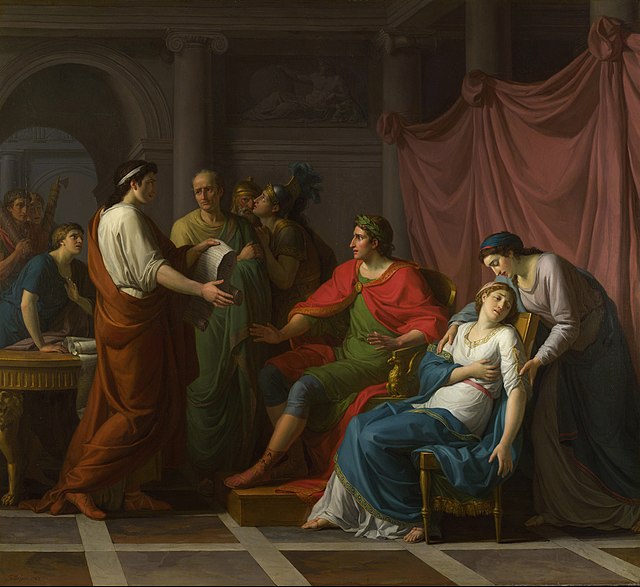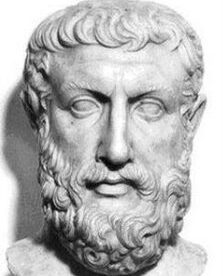
Virgil Reading the Aeneid to Augustus and Octavia, by Jean-Joseph Taillasson (1787)
Available from Abebooks and Amazon
Book Length: 442 pages
In the realm of literature, there are few works that compare to Virgil’s Aeneid; and in our time, there are few literary works which are as needed as this one. Western man finds himself in a similar place to that faced by the men of fallen Troy—among the ruins and facing near total annihilation, from both a spiritual and physical standpoint. Though the ruins of Western civilization are more figurative than the flames which Virgil tells us engulfed Troy, they are still ruins. Doubters need only to consult images from a century ago, and note there not only the evidently more magnificent architecture, but also the more modestly dressed people. These are apparent representatives of a time when our civilization was in a superior state to the one we find it in today.1
Need anything be said about the sorry demographic state of our European peoples? A slow death is still a death; like the death of Troy, this death of the West was initiated by deception and treason. Yet it is shortly after this death of Troy that the Aeneid begins, though it is returned to in Book II, when Aeneas, with a profound sorrow, relates to the hospitable Dido his story.
It is well worth noting the bravery of this legendary man, as it ought to serve as a model to ourselves. Among the clattering of swords and burning of homes, he is able to rouse his spirit to fight on amid seemingly impossible odds, for he says “My gear, / Men, bring me my gear. The last light calls the conquered” (II. 872-873).2 Such words are fit to inspire the magnanimous and upbraid the cynic. Thus is he able to call together a band of Trojans to fight the Greeks, and with the help of providential—though pagan—forces, leads what little remains of his people to set sail for Italian shores.
The death of Troy, then, is not an annihilation—it is a death that precedes a resurrection, which led the brilliant G.K. Chesterton to remark in his book The Everlasting Man that:3
It is almost as if two great tools or toys of the same timber, the divine and the human, had been in the hands of Providence; the only thing comparable to the Wooden Cross of Calvary was the Wooden Horse of Troy.
(Chesterton 156)
This is why this epic went on to inspire seemingly countless generations, from the days when Augustus was emperor, through the Middle Ages and well into our Dark Age, and why it will continue to do so. As Aeneas, the patriarchal king figure who leads his people into the promised Latin land—akin in a sense to the holy prophet Moses—so to must Western man reclaim patriarchy to reclaim kingship; for without men who can lead, both the Trojans and the Jews would have been destroyed, and so therefore we shall too be destroyed. Note however, that in both cases there was a providential force which provided the respective patriarch to their people. Hence the world’s attack on patriarchy, for the patriarchy of man descends from the patriarchy of God. For as St. Paul wrote: “I bow my knees to the Father of our Lord Jesus Christ, Of whom all paternity in heaven and earth is named” (Ephesians 3:14-15). 4
Even the pagans of old understood this, though in a dim manner, as their great patriarchal figures are always said to have descended from their gods—including Aeneas. Subvert the mortal patriarch, and the rest of society’s members will easily be lead astray from the immortal patriarch, Our Father in Heaven.
Aside from these and many other profitable lessons which can be learned from this grand tale, the story itself is wonderfully written, and translated well by Fitzgerald. Through this mediator of language, the prose of Virgil comes forth to capture the imagination in a way that few writers have ever matched before or since. The following excerpt is one of many examples of how the one whom Dante deemed fit to call “the Poet” utilized language to paint not only a picture with words, but also a broader message beyond mere aesthetics:
Their tarry hulls with bubbling wakes behind
Slipped through the water, and the waves were awed,
The virgin woods were awed at this new sight:
The soldiers’ shields that flashed in distant air,
The painted ships afloat upon the river.
VIII. 124-128
The visuals here reflect not only the beauty of the scenery, but also that the land itself will become transformed by the new arrivals—to Latium and Arcadia, primordial and idyllic towns, will come a war like the one that was waged between Greece and Troy. The woods, however, being virginal, are innocent to the grim reality that the shields and ships are to bring with them. Thus, the “virgin woods” are “awed” at this sight of painted ships and soldiers, much in the same manner as the virginal Miranda was upon seeing the virile Ferdinand in Shakespeare’s The Tempest. It is not the Trojans who wish to bring war to the Arcadian Greeks nor the Latins, but it is the jealousy of the goddess Juno which will make things so.
Another important aspect of the whole story is that it provides deep insight into the mentality of a pagan Rome realizing its destiny to rule the world. To her people, Anchises, the noble father of Aeneas advises:
Roman, remember by your strength to rule
Earth’s peoples—for your arts are to be these:
To pacify, to impose the rule of law,
To spare the conquered, battle down the proud.
VI. 1151-1154
Yet Rome was still in the dark as to the fullness of her destiny—hence between hard voyages and tough battles, scenes are shown to the reader of men and women alike mourning the dead with funeral pyres. The pagans without Christ were spiritually lost, and did not know the true end of life; hence the despair which underlies their ceremonies for the dead. Confronting this pagan despair, St. Paul pointed to the truth of the Resurrection:
And we will not have you ignorant, brethren, concerning them that are asleep, that you be not sorrowful, even as others who have no hope. For if we believe that Jesus died, and rose again; even so them who have slept through Jesus, will God bring with him.
– 1 Thessalonians 4:12-13
Such words are quite relevant to our time, considering how many there are today that have no hope.
Our days are quite grim, but they also contain many blessings which are taken for granted. One of these is that we are at a point in time where we not only have a rich history, but have an easy access to this history by means of books and the Internet. We are at a moment where we can learn from the natural wisdom of the pagan sages and the supernatural wisdom of the saints at a pace far more rapid than was possible before; let us take advantage of this, for if we do not treasure this knowledge, who will?
Though this is a work that cannot provide us with hope for eternal life, it will certainly help us confront the temporal problems that we face. May this book inspire many a man as it has done throughout history! May Aeneas’ words resound once more to touch the hearts and minds of many a Western man today!
Be patient: save yourselves for more auspicious days.
I. 282-283
- Objectors might propose sneeringly that even if Western civilization was superior at that time, it was not perfect; to that much there may be an agreement, for no civilization—especially the spiritually and morally sterile Liberal-Marxist “world civilization” so commonly championed by these same objectors—can reach utopia, because man is fallen. Hence the true meaning of utopia, as translated from the Greek of St. Thomas More, is “no place” or “nowhere”.
-
All quotations from this text are provided from:
Virgil. The Aeneid. Translated by Robert Fitzgerald. Vintage. 1990.
-
Chesterton, G.K. The Everlasting Man. Ignatius Press. 1993. p. 156.
A review of this book can be found on this website, at the following link:
-
Bishop Challoner’s footnote explains this point further:
“All paternity”: Or, the whole family. God is the Father, both of angels and men; whosoever besides is named father, is so named with subordination to him.
